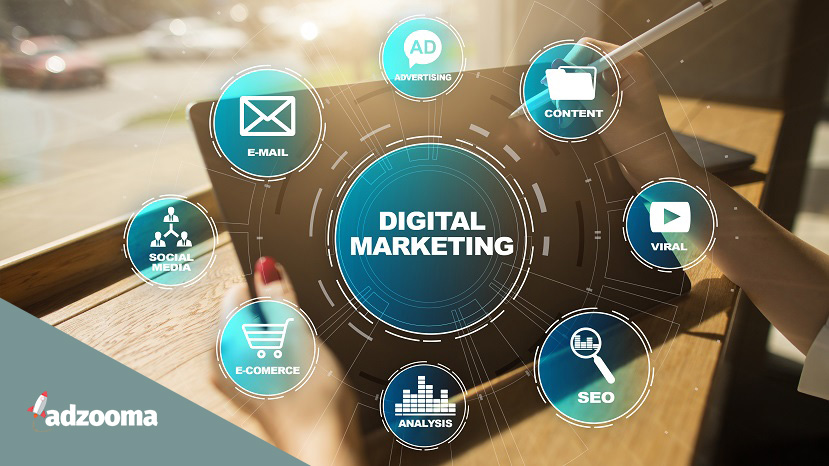The digital element of your marketing strategy could well be the most important. Customers are spending more time online and expect the same level of communication, availability, and accessibility as they would within the ‘real world’. Despite the numerous benefits of digital marketing, developing and implementing a successful strategy can be challenging.
Whether you are a well-established organisation or a sole trader launching a new venture, expending the appropriate time and resources to create an achievable plan will give you and your business the clarity, confidence, and control to attain your goals.
Check out Artus Marketing on Adzooma Marketplace.
Digital marketing post-COVID
The businesses that have survived and thrived through the pandemic have been the ones that have implemented proactive rather than reactive approaches in the face of external problems. As opposed to adapting, these companies have developed resilience, retaining their new knowledge and tested strategies to equip them for similar situations in the future.
Creating a digital marketing strategy that embraces this resilient mindset will help towards futureproofing its success. However, with competition growing even fiercer online, it will also take an innovative approach to be effective. Only the biggest, boldest, and smartest examples of digital marketing are likely to cut it, providing an opportunity to forge your most creative strategy yet.
The basics of digital marketing

Search online for digital marketing strategies and you will be greeted by an abundance of different approaches. From the more traditional forms of precision planning to contemporary cloud-based constructs, knowing how to improve on your existing strategic methods or to start completely from scratch can be intimidating.
Whether your company has a fully-fledged digital marketing team or you are going it alone, there is no right or wrong system to use. The best method is to start by identifying your key goals and come up with ways in which they might be achieved. Reflect on your past strengths and weaknesses, establish realistic targets, then try a variety of digital marketing methods to see which ones help or hinder your progress.
Here are some of the basics of digital marketing that every business should already have in place.
1. Website, blog, and social media channels
These need to be visually engaging, kept up to date, and fully optimised to offer the best user experience. Maintaining an active online presence is crucial, and it works both ways. Your digital marketing strategy should not only include regular and original content updates but also guidance on instigating, encouraging, and maintaining communication with new and existing customers as well as colleagues and even competitors. Your online presence should mirror your business.
2. Search engine optimisation (SEO)
If you think you have already got this nailed, think again. Google regularly update their parameters to ensure more precise results for search engine users. What may have been effective on your website in the past can change literally overnight, resulting in data that no longer performs and a reduction in traffic. Focus on content and links that demonstrate expertise, authoritativeness, and trustworthiness (E-A-T), as used by Google to determine site values and rankings. You will also find plenty of SEO advice online including this blog by Artus Digital Marketing.
Another way to monitor your SEO is through Adzooma’s SEO Performance Report, which analyses your website and identifies immediate actions you can take to improve. You’ll then get a more detailed breakdown of your performance into 4 key areas: keyword performance, onsite SEO, page speed and backlinks.
The report is available to all Adzooma users, try the basic version for free to get a taste of what this report can offer. Not an Adzooma user? Sign up for free, here.
3. Online advertising
The next step on from a successful website and active social media channels is online advertising. With its ease to set up and impressive potential for return on investment, using the likes of Google, Microsoft and Facebook adverts is a must in any digital marketing strategy. Try this blog on how to get started with online adverts for practical tips you can implement yourself or contact the Adzooma team for specific support with managing Google and Microsoft campaigns.
Specific strategic objectives
It is also worth keeping in mind that your digital marketing strategy should always be focused on your specific digital objectives rather than merely contributing to your wider marketing end goals. For example, you might want to find new ways to generate leads (have a look at this blog post for ideas), or you could set specific ROI targets for your online adverts.
Resilient digital strategies

During 2020, it was not enough for businesses to merely weather the storm. Being able to adjust to the constantly changing situation was one thing, but for a company to see in 2021 on a high, they needed to have developed a stronger, smarter, and sharper perspective of their aims and audiences. Growing a resilient business became the new buzzword, and the benefits are as applicable to digital marketing strategies as they are to company cultures and teams.
While much of your latest digital marketing strategy should be specific to your current company objectives, the easiest and most obvious way to futureproof your plans is to employ this resilient approach. You need to understand what scenarios could arise, and plan ways in which you and your team will be able to overcome them (including specific details of any resources required).
Take the time to reflect on what you have learned from the previous twelve months from a purely digital marketing perspective. Evaluate each element in turn and note how or even if your company can replicate or develop these further. Including resilience building into your strategic planning now will pay dividends in the long run when it comes to strengthening your online presence.
Understand your audience
Creating and updating a profile for your target customers will undoubtedly form a key component of your marketing strategy, but it should not be simply replicated for your digital plans. While there may be many elements of similarity to the audience you attract into your physical workspace, your online audience are likely to have different expectations and needs.
When it comes to e-commerce, many businesses find themselves appealing to completely new customers who are free from the restrictions of geography, time, and accessibility. Companies therefore need to build up detailed information about their existing and new online customers, as well as exploring any potential markets that could be tapped into in the future.
For a more direct approach to data sourcing, social media is ideal for creating opinion polls and encouraging feedback from existing and potential customers. Include links to questionnaires on your blog or in e-newsletters and offer incentives such as prizes or giveaways. You can also collect valuable analytics about your website visitors to inform your audience profiles.
Prioritise content marketing
While digital advertising continues to be incredibly effective, there has been a recent shift in online engagement that has led to a surge in the success of content marketing. Even before lockdown, internet usage had been steadily increasing with many in-person pursuits being replaced by their digital equivalents. Factor in months of enforced time at home and our online worlds have become all the more vital for communicating, learning, working and relaxing.
The difference with content marketing this time is the focus on quality. Just as Google assesses a website for its E-A-T credentials, online users are interested in sources that can provide a voice of expertise. From 2000-word blog articles and free downloadable guides to engaging webinars and professional podcasts, offering exclusive resources has become hugely beneficial to businesses.
An additional advantage is that most companies will already be well versed in digital content marketing, so it may only be a matter of extending wordcounts and demonstrating your industry knowledge to add value to your content. Take a look at these seven top content marketing ideas for inspiration.
Manage your online reputation
Regardless of the sector, type and size, every business has a brand image to build. It is an ongoing process and should feed into all the elements of company practice, including digital marketing. As we have seen time and time again, making even the smallest of mistakes online can cost a company its reputation and customers. It is therefore important for businesses to continually assess and actively manage their online reputation as part of their digital marketing strategy.
When the digital world is not only recording but often amplifying your online activity, keeping track of what you are posting and how it is being received is vital – and it works both ways. While your business should post content responsibly, you also have a duty to respond to content that concerns your company, your customers, and your sector. Negative review on Google? Send a reply. Active feed about changes in your industry? Provide an expert opinion. What you leave unsaid can often do as much damage as what you do say.
Including a methodology for reputation management within your digital marketing strategy will help you efficiently monitor, improve, and even futureproof your digital brand image for the long-term. Contact a professional marketing agency such as Artus Digital Marketing if you need support.
Going forward with digital marketing

The challenges of 2020 have prompted businesses to be even more forward-thinking when it comes to short- and long-term strategic planning. Having found new and increasingly innovative ways to use digital technology, there is now the opportunity for businesses and professionals to reapproach online marketing with a fresh perspective.
As with any strategy, there are no guaranteed methods to futureproofing your plans. Your digital marketing objectives should be formed with the intention of amendments and improvements being made. Continue with the practices that have benefitted your business in the past, develop some of the suggestions for resilient digital strategies in this article, and ensure you are regularly measuring, analysing, and acting on your metrics.
Digital marketing is developing every single day, and part of the adventure of running a business is being along for the ride. There is no need to be an analytics expert or a coding master to make the most of your online presence. Use the resources available to you, learn from success stories, and above all be creative. For business and buyer alike, there is no greater motivator than originality.




